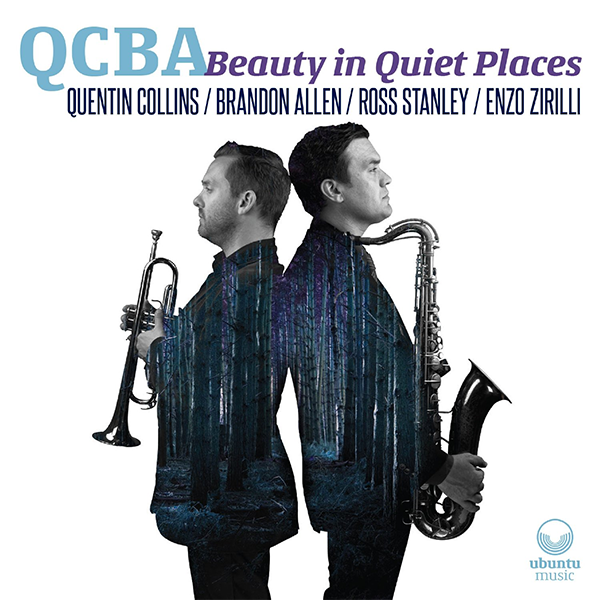
by Ian Mann
January 07, 2016
/ ALBUM
There is much to enjoy on this album with some great individual and collective moments.
Quentin Collins / Brandon Allen Quartet
“Beauty in Quiet Places”
(Ubuntu Music)
I’m indebted to saxophonist Brandon Allen for forwarding me a copy of the latest album from the quartet he co-leads with trumpeter Quentin Collins. When this album first dropped through my letterbox the title made me wonder if this famously hard grooving, hard driving quartet had gone all soft on us and recorded a collection of ballads. However, although there are instances of the subtleties that this versatile collection of musicians are also equally capable of, the majority of the music is delivered in the invigorating, swinging style we have come to expect from this quartet. “Beauty in Quiet Places” is a worthy follow up to 2011’s “What’s It Going To Be?”, an album that is reviewed elsewhere on the Jazzmann and which features the same quartet with Collins and Allen joined by Ross Stanley on Hammond organ and Enzo Zirilli at the drums.
All the members of this talented combo have been regular presences on the Jazzmann web pages in a wide variety of musical contexts, collectively too numerous to list fully here. Key among these has been the regular presence of both Collins and Allen in bands led by the American born, Paris based bassist and composer Kyle Eastwood who graciously provides the perceptive liner notes for this new album.
Recorded in 2013 under the truncated band name QCBA (the quartet has also traded as Drugstore Cowboy in the not too distant past) “Beauty in Quiet Places” is an all instrumental album and features the compositions of the co-leaders exclusively. Its predecessor included a tune by Zirilli plus an arrangement of Stevie Wonder’s “Smile Please” that featured a guest vocal by Natalie Williams. This latest recording features the core quartet only and represents an attempt to capture something of the spirit of the group’s energetic and exciting live performances.
The new album goes back to the band’s roots and their collective love of Blue Note inspired hard bop and soul jazz and begins with Collins’ Latin flavoured “Fuerteventura” with its Spanish style melodic motifs and typically fluent and forthright solos from Collins on flugel and Allen on tenor, these punctuated by an absorbing series of colourfully brushed drum breaks from Zirilli as Stanley’s Hammond provides the harmonic glue to hold it all together.
Allen’s exuberant, hand-clap driven tune “Handshake” could have been lifted directly from a Jimmy Smith Blue Note album and the piece allows Stanley, one of the UK’s most in demand organists, the chance to demonstrate his chops as he shares the limelight with Allen’s gutsy tenor and Collins’ agile trumpet. Meanwhile Stanley’s own solo is a gospel flavoured delight.
Allen’s title track is not the expected ballad but instead a piece that Eastwood describes in his liner notes as having “an irresistible back-beat, tight group interplay and strong solos all round”. Who am I to argue with Kyle’s assessment, this is a relaxed yet energetic performance with powerful, yet probing, solos from Allen on tenor, Collins on what sounds like flugel and Stanley at the Hammond - all supported by Zirilli’s crisply propulsive drumming.
Inspired by the saxophonists John Coltrane and Joe Henderson Allen’s “Modal Transition” features a busy theme incorporating some highly sophisticated group interplay plus energetic soloing from the muscular Allen, mercurial Collins and fleet fingered Stanley.
Collins’ “Oscar’s Lullaby”, a dedication to his young son, presents an altogether gentler side of the band with the composer featuring on flugelhorn and with Allen undertaking a rare outing on soprano sax. There’s an adventurous quality about Collins’ writing that takes the music beyond mere balladry and Allen, in particular, impresses with the quality of his soloing on his ‘second horn’.
Allen’s “Don’t Behave” has a bustling theme inspired both by bebop and by later developments. Despite the retro-trappings QCBA’s music always sounds focussed and surprisingly contemporary, the result perhaps of the co-leaders’ busy session schedules and involvement in the pop and rock worlds. This piece features powerful but eloquent solos from Collins on effervescent trumpet, Allen on bruising tenor and Stanley on wailing Hammond plus something of a drum feature for the consistently excellent Zirilli.
Collins’ brief “Amuse Bouche” features unison horn lines above the swell of Stanley’s Hammond and Zirilli’s skittering drum grooves. The piece appears to be cut short just as Stanley seems to ready to embark on a solo and it thus becomes something of an introduction to the closing “Paw of Discontent”, another Collins composition, and one apparently dedicated to the capricious temper of his pet cat. It’s a suitably feisty track introduced by organ and drums and one that features typically punchy and hard hitting solos from the co-leaders with Allen going first on tenor followed by the composer on trumpet. There’s also some sparkling interplay between the horns, a surging Hammond solo from Stanley and a terrific drum performance from Stanley that manages to be both forceful and inventive.
There are no real surprises here, QCBA don’t set out to try and re-invent the wheel, but what they do they do really well. ‘Cooking’ is an adjective that is regularly used to describe this quartet’s performances and they certainly keep the cauldron bubbling here thanks to their accomplished, ebullient musicianship and well written tunes that honour the Blue Note tradition yet manage to avoid copying it too slavishly. As ever there is much to enjoy on this album with some great individual and collective moments and for me the decision not to include guest artists this time round represents the right one. Most jazz listeners should gain considerable enjoyment from this recording but the best place to hear QCBA remains the live environment, specifically a hot, crowded, intimate club where the power, excitement and sheer quality of their music can really communicate itself.
blog comments powered by Disqus